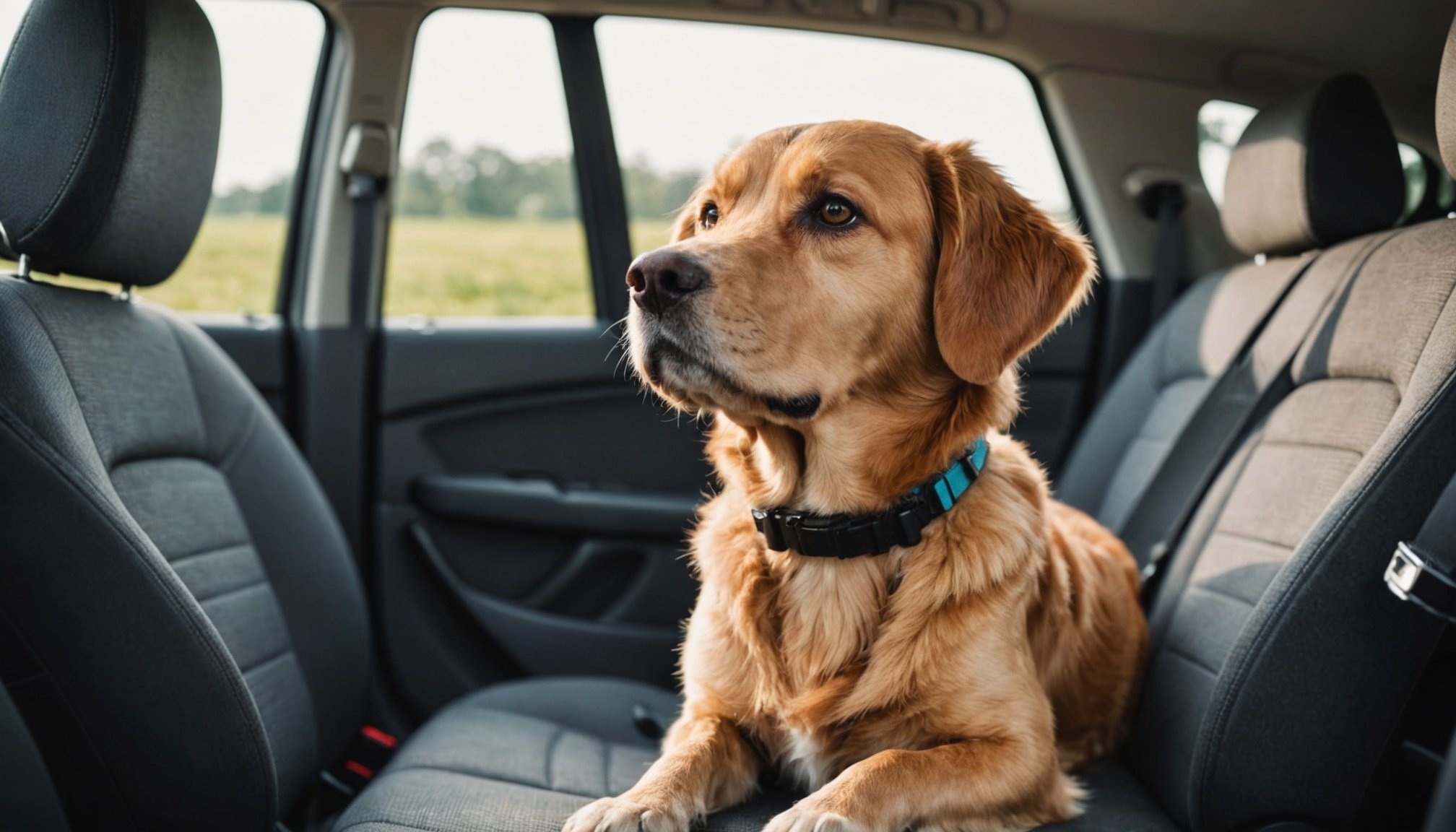Top Strategies to Calm Your Canine: Easing Dog Anxiety During Car Journeys
Traveling with your dog can be a wonderful adventure, but for many dogs, car rides can be a source of significant anxiety. Whether your dog suffers from motion sickness, separation anxiety, or general travel stress, there are several strategies you can employ to make car travel more comfortable and enjoyable for your pet.
Understanding Dog Travel Anxiety
Before we dive into the solutions, it’s essential to understand why dogs might feel anxious during car rides. Here are a few common reasons:
Also to read : Effective Techniques to Curb Gentle Nipping in Your Border Collie: A Complete Training Guide
- Motion Sickness: Many dogs experience car sickness, which is often triggered by the stress associated with car travel rather than the motion itself.
- Separation Anxiety: Some dogs may feel anxious when they are in a new or confined environment, such as a car.
- Lack of Familiarity: Dogs may feel uneasy in the car due to the unfamiliar sights, sounds, and smells.
Preparing Your Dog for Car Travel
Preparing your dog ahead of time is crucial for reducing travel anxiety. Here are some steps you can take:
Gradual Desensitization
Gradually introducing your dog to the car can help them become more comfortable with the environment. Start by letting your dog explore the car while it is stationary, then progress to short drives around the block. Reward your dog with treats and praise for calm behavior.
Topic to read : Mastering the Art of Beagle Training: Effective Strategies to Curb Excessive Barking at Strangers
Training Sessions
Training sessions can help your dog associate car rides with positive experiences. Take your dog on short trips to places they enjoy, such as the dog park or a favorite pet store. This helps form positive associations with car travel.
Physical and Mental Stimulation
Ensure your dog is physically and mentally exhausted before a long car ride. A tired dog is a happier traveler. Engage your dog in physical activities like walks or runs, and provide mental stimulation through puzzle toys or training sessions.
Calming Aids and Products
There are several products and aids that can help calm your dog during car travel.
Lick Mats and Interactive Toys
Lick mats and interactive puzzle toys can be highly effective in distracting your dog from stressful stimuli. These tools encourage repetitive licking or problem-solving, which can release calming hormones and reduce anxiety.
Calming Music
Music can be a powerful tool in reducing stress and anxiety in dogs. Research by Pooch & Mutt has shown that melancholic, low-energy songs with gentle acoustics can significantly calm anxious dogs. You can find curated playlists like “The Perfect Playlist for Relaxed Pooches” on platforms like Spotify.
Pheromone Products
Products like Adaptil mimic the natural pheromones that mother dogs produce to calm their puppies. These pheromones can be sprayed in the car, on your dog’s bedding, or on their clothing to provide a sense of calm and comfort. Adaptil is highly recommended by veterinarians and has been shown to reduce signs of travel stress such as panting, shaking, and restlessness.
Practical Tips for Calm Car Rides
Here are some practical tips to make car rides less stressful for your dog:
Secure and Comfortable Seating
Ensure your dog is securely and comfortably seated during the ride. Use a dog car seat or harness to keep them safe and provide an elevated view out of the window, which can help prevent motion sickness.
Frequent Breaks
Take frequent breaks during long car rides to allow your dog to stretch, relieve themselves, and get some fresh air. These breaks can help reduce stress and prevent motion sickness.
Keep Your Dog Entertained
Bring along toys and chews to keep your dog entertained and engaged during the ride. A favorite chew toy can prevent your dog from getting bored or anxious, while tug toys and fetch toys can be used at rest stops to wear them out physically and mentally.
Medications and Supplements
In some cases, medications or supplements may be necessary to help calm your dog during car travel.
Prescription Medications
Medications like Alprazolam (Xanax), Amitriptyline, and Fluoxetine (Prozac) can be prescribed by your veterinarian to treat anxiety in dogs. However, these medications should be used under veterinary guidance due to potential side effects.
Natural Supplements
Natural supplements such as CBD and calming melatonin chews can also be effective. However, it’s crucial to consult with your veterinarian before giving your dog any supplements to ensure they are safe and appropriate.
Table: Comparing Calming Aids for Dog Travel Anxiety
| Calming Aid | Description | Benefits | Potential Side Effects |
|---|---|---|---|
| Lick Mats | Designed to promote calm behavior through repetitive licking. | Reduces anxiety, provides mental stimulation. | None reported. |
| Calming Music | Curated playlists with low-energy songs. | Reduces stress and anxiety. | None reported. |
| Adaptil | Pheromone-based product mimicking mother dog’s pheromones. | Reduces travel stress signs like panting, shaking. | None reported. |
| Alprazolam (Xanax) | Prescription medication for anxiety. | Quick relief from panic and anxiety. | Sedation, uncoordinated walking, increased appetite. |
| Amitriptyline | Prescription antidepressant for anxiety disorders. | Treats separation anxiety and excessive grooming. | Sedation, dry mouth, increased appetite. |
| CBD Supplements | Natural supplement for calming. | Reduces anxiety without sedation. | Consult veterinarian for potential interactions. |
| ThunderShirt | Pressure wrap providing gentle pressure. | Provides comfort and reassurance. | None reported. |
Quotes from Experts
- “Calming music is a hugely useful tool that can be used for any dog, whether anxious or not. When introducing music and new sounds to your dog, ensure you are calm and that the experience is positive. Reward their calm behavior with lots of treats and praise.” – Dr. Linda Simon, Veterinary Surgeon.
- “Before traveling with dogs in the car for a long distance, take some short practice trips that end in positive experiences for them. Rides to the dog park or a favorite pet store, for example, will help form more positive associations with riding in the car.” – Falsetta, Expert in Pet Travel.
List: Tips for a Stress-Free Car Ride with Your Dog
- Start with Short Trips: Gradually introduce your dog to car travel with short trips to familiar places.
- Use Calming Aids: Utilize lick mats, calming music, and pheromone products to reduce anxiety.
- Secure Your Dog: Use a dog car seat or harness to ensure safety and comfort.
- Provide Mental Stimulation: Bring puzzle toys and chews to keep your dog engaged.
- Take Frequent Breaks: Stop regularly to allow your dog to stretch and relieve themselves.
- Consult Your Veterinarian: Discuss any anxiety issues with your vet and consider prescription medications or supplements if necessary.
- Keep Your Dog Hydrated: Ensure your dog has access to water during the trip.
- Avoid Feeding Before Travel: Feed your dog a light meal a few hours before travel to prevent motion sickness.
- Ensure Proper Identification: Make sure your dog has a microchip, collar, or other identification in case they get lost during the trip.
By following these strategies, you can significantly reduce your dog’s anxiety during car travel, making the journey more enjoyable for both you and your pet. Remember, patience and preparation are key to ensuring a calm and comfortable travel experience for your dog.











